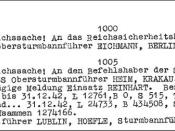In his essay, "Inside the Bunker", John Sack successfully portrays his view of the Holocaust deniers and his opinions on the consequences and causes of important issues such as hate, persecution, and denial. Because Sack is able to minimize the distance between himself and the implied reader, he is able to effectively convey his message. The reader first learns that Sack is Jewish, which instantly creates sympathy for him, since the deniers refuse to believe that the Germans murdered six million people of his culture. In the opening paragraph, Sack's honesty is also expressed as he describes his frustrations with the conference, referring to it as "the central asylum for the delusion that the Germans didn't kill any Jews" (280). Because the implied reader is not a revisionist, the reader is likely to have a very similar initial reaction to "the people who say the Holocaust didn't happen" (280). Throughout the essay, the author is able to remain unbiased, while never compromising his original beliefs of the horrible realities of the Holocaust.
Sack describes the deniers as "the most middling of Middle Americans" instead of neo-Nazis and anti-Semites. While Sack respects the revisionist, he does discredit the deniers' argument of "No Holes? No Holocaust" with Charles Provan's personal research. Because the implied reader is able to identify with Sack without changing his beliefs about the Holocaust, he is easily persuaded to adopt this unexpected view of the revisionist. Throughout the essay, Sack uses this technique to craft many of his beliefs into appealing ideas for the reader to absorb.
As a journalist, Sack was not attempting to assist nor hinder the spread of Holocaust revisionism, but rather to report his experiences from the IHR conference. Sack's essay expresses both negative and positive aspects of revisionism and its opposition. The...


